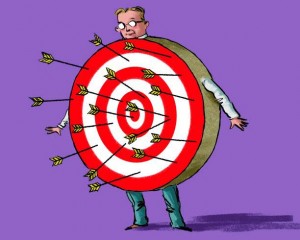Few organizations or groups are teased or scandalized like the Catholic Church. On the other hand, with 1.1 billion members of the Church (1/6th of the global population) which constitutes the largest faith community on the planet, I suppose it’s a big target.
 As with many other things, size matters.
As with many other things, size matters.
The Church is described as the “body of Christ,” with each constituent member fulfilling a role or function in that body. Just as with your corporeal body, if one of the parts does not function properly, the system is at risk. In the same way, even though our bodies are made up of trillions of cells, if just a handful start acting up (cancer comes to mind), we immediately ignore the rest and give our undivided attention to the few causing trouble.
The Catholic Church (along with other faith groups) suffer from the same issue. Despite the health and good of the majority, we tend to only give attention to a few bad spots. The reason is that although the Church was set up by Christ, it’s composed of fallible human beings. St. Paul talks about this in 2 Corinthians 4: 6-7…
“For God who said ‘Let light shine out of darkness’ has shone in our hearts to bring to light the knowledge of the glory of God on the face of Christ. But we hold this treasure in earthen vessels, that the surpassing power may be of God and not from us.“
This passage reminds us of how the most precious things are often held in seemingly inferior containers. A terracotta lamp for light, a small box for a diamond ring…
A helpless baby for the Creator of the universe.

The periods of Catholic history which catch the most flak do not represent the entire Church, and yet when a critic of the Church comes along, they usually cast the entire “body” as equal with those cancerous elements. Here are some less-than-glorious cases:
The Spanish Inquisition
Sale of indulgences
Persecution of non-Christians
Conduct during the Crusades
Recent sexual abuses within the priesthood
…and many more
With nearly 2,000 years of history, the countless people involved in the Church had to screw up somewhere. I don’t think this demonstrates that the Church is evil or even false, but only that it is that “earthen vessel” St. Paul talked about in his letter to the Corinthians. Now, let’s look on the other side of the Church’s coin and see what positive influences its had on humanity:
A patron of the arts (much of prized Renaissance art/literature/architecture came from artist inspired by Biblical themes)
Modern time using Pope Gregory XIII’s “Gregorian Calendar”
The so-called “Dark Ages” were actually kept alight by the Church after the fall of Rome with Catholic universities and literacy
Music. Beethoven, Mozart, Verdi, not to mention the song of Gregorian chant and other monastic styles
Pope Leo the Great turned Attila the Hun from his invasion of Europe, probably rescuing Western civilization
The founding of universities, hospitals, community centers, and other service/learning institutions worldwide
Papal condemnation of slavery in America, support of the civil rights movement and others including the fall of Soviet Russia, condemnation of the war in Iraq, and support of many elements with the Occupy Wall Street movement
Enormous contributions to science, including Gregor Mendel (genetics), Georges Lemaitre (Big Bang theory), Henri Becquerel (discovered radioactivity), and many more.
The Vatican is also responsible for the preservation of countless priceless artifacts and treasures of Western art
Charity, care for the poor, feeding the hungry…
The list goes on
Yes, I listed more positive than negative. The reason isn’t because I’m showing favoritism, it’s because frankly, I found more good features of the Church than bad. But again, this only shows that even the Church founded by Christ himself is imperfect because he left to it imperfect beings. We shouldn’t be surprised with this move though, after all, he did the same thing when trusted Mary–a mere human–to nurture the savior of mankind.
Nothing can excuse the Church for many of the abuses over the centuries, and indeed, many in the leadership of the Church acknowledge and are working to heal these wounds. However when we think of the Church, are we looking at the system Christ left to us as our reason for belonging or are we looking at the people running it? If you have a problem with the Church and are part of the “body,” it is both in your best interest and responsibility to help mend the body. After all, it would suck if your arm broke and instead of helping it heal, you lobed it off because it was a temporary problem.
What conflicts have you had with the Church? Did you stick around and contribute to a solution on the local level? Can you list other positive or negative contributions the Church has had on society?

